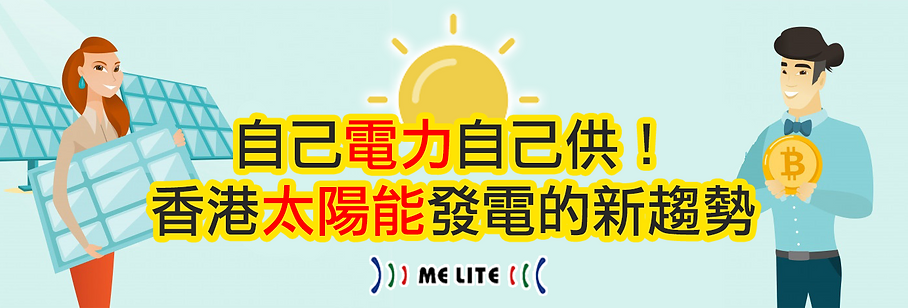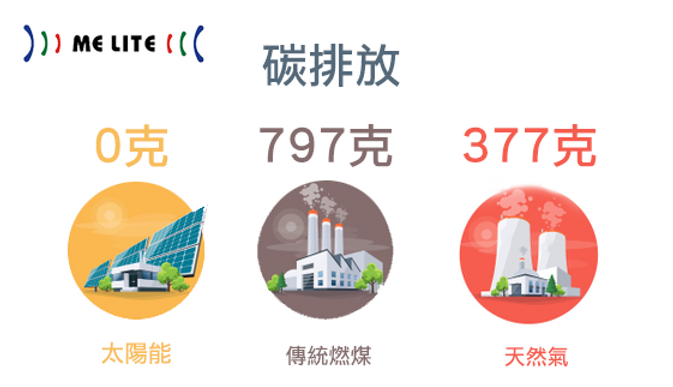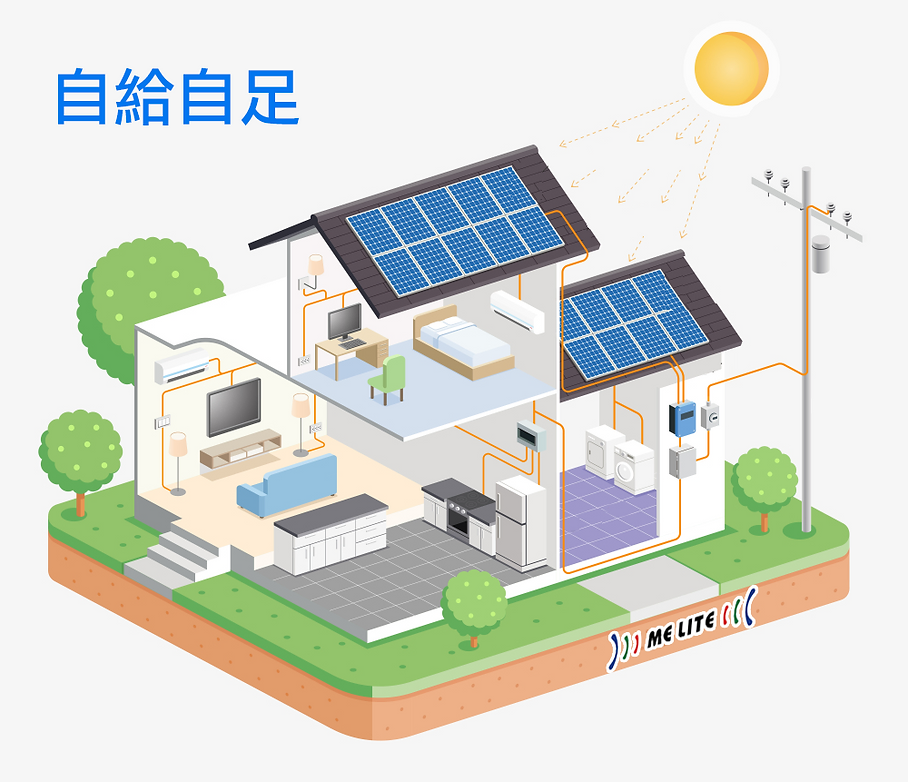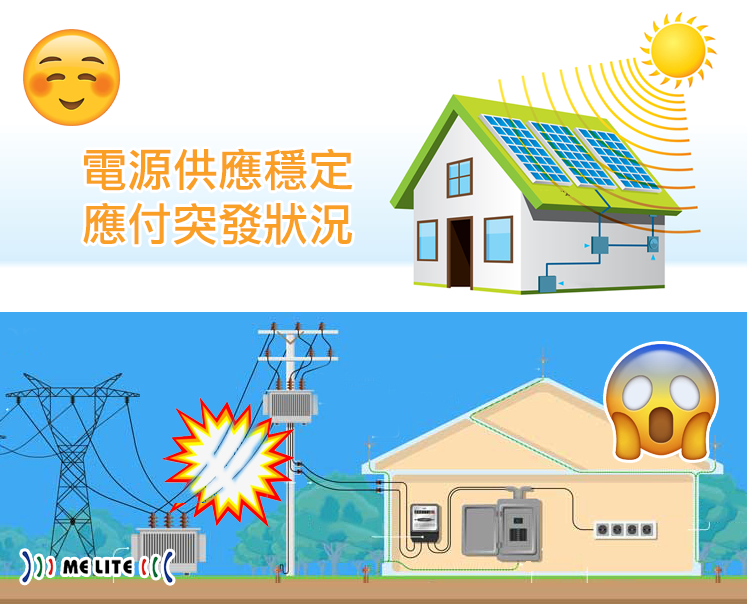Supply your own electricity! New Trend of Solar Power Generation in Hong Kong

Supply your own electricity! New Trend of Solar Power Generation in Hong Kong
As we all know, solar energy is one of the largest sources of energy received by the earth, and its continuous and clean supply can effectively slow down the greenhouse effect. Recently, some power companies have even introduced a “Renewable Energy Feed-in Tariff” to encourage the public to install solar energy systems to generate electricity, and the power companies will buy back the electricity at their own expense. Apart from making money from selling electricity, turning your home into a small-scale solar power plant can also provide you with a stable supply of electricity, making it possible for you to supply your own electricity, so that you do not need to ask for electricity! In recent years, different regions in Asia have promoted the development of solar energy, such as Taiwan’s “Green Roof Programme” and Japan’s farmers can “grow electricity” while growing vegetables, which shows that it is a big trend for individual households to use solar energy to generate electricity. The Hong Kong Disneyland has also joined the solar power industry this year by installing more than 4,500 solar panels in the resort area.
Solar Power Generation : Beneficiaries
In the past, the stereotype of solar power was that the cost was high and only the government or big businessmen could participate. However, nowadays, solar power has become more mature and the threshold has been lowered accordingly. Individuals and businesses can now make good use of their rooftops and balconies to install solar energy systems. As long as the roof faces south or southward, is less blocked by nearby buildings and trees, and is able to absorb sufficient sunlight, it is the ideal place to install a solar energy system.

In other words, householders with rooftops, balconies, or even outdoor parking spaces or gardens, such as village houses, detached houses, industrial buildings, warehouses, and so on, can also participate in solar power generation and supply their own electricity. For example, a rooftop with an area of about 25 square metres is sufficient for installing a solar energy system with a capacity of 2.5 kilowatts, and the electricity generated annually is sufficient to supply half of the electricity consumption of a typical Hong Kong household. Apart from buildings, open spaces that are permanently open are also good choices for installing solar energy systems. For this reason, many villagers are approaching the Government to find out if they can “grow electricity” on abandoned agricultural land. It is clear that solar power is becoming more and more popular, and that it is not just a technology exclusive to the Government and businessmen, but that the public can also benefit from it.
Advantage 1:Environmental

Environmental protection is one of the most important international issues in the 21st century, and carbon dioxide emissions from the burning of fossil fuels such as coal and oil are the biggest culprit of global warming. To mitigate this global crisis, we must accelerate the adoption of renewable energy, and solar energy is an excellent choice. As the technology of solar panels advances, the energy efficiency of the production process continues to improve. According to Greenpeace’s data, the energy generated by solar panels in an average of 1.3 years can offset the energy consumption caused by the production of solar panels.
In terms of carbon emission, traditional coal burning emits 797 grams of carbon, and cleaner natural gas emits 377 grams of carbon, whereas solar panels, with a lifespan of 25 years, emit zero carbon for more than 20 years of the power generation process, which shows that solar power is a new source of energy that is environmentally friendly and highly efficient at the same time.
Advantage 2: Self-sufficiency

Hong Kong’s electricity supply is already monopolised by two major players – CLP Power Hong Kong Limited (CLP) and Hongkong Electric Company Limited (HEC) – so it can be said that no one in Hong Kong will be spared in the event of tariff increases by the two power companies. In July 2018, the Executive Council approved the development plans of the two power companies for the next five years. They also took the lead in increasing tariffs by 2% and 6.8% in October of the same year and January of this year, and have foretold that they will continue to increase tariffs in the next five years.
Solar panels can convert solar energy into usable electricity, and the electricity generated can be used for the property’s own consumption. Taking a typical village house in Hong Kong as an example, the average monthly electricity consumption of each household in Hong Kong is about 380 kWh. If one-third of a 700-square-foot rooftop is used for the installation of solar panels, the annual electricity generation can reach 3,000 kWh, which is sufficient to supply more than half of the electricity consumption of a typical Hong Kong household. Users can also choose to transmit the electricity to the power grid and “sell” it to the power company, saving money and generating revenue at the same time. With the introduction of the on-grid tariff in the new Scheme of Control Agreement, the price of electricity has been adjusted upwards to $3-5 per kWh, which is nearly four times higher than the maximum standard tariff.
Advantage 3: Stable power supply to cope with unforeseen circumstances

A diversified fuel mix can provide stable power for the community, and even if the supply of a certain type of fuel is disrupted, power generation will not be affected. Therefore, it is also important to develop renewable energy as a back-up power source. Solar radiation in Hong Kong is highest in summer, but on average, it is quite stable throughout the year, which shows that solar energy potential is also very high and stable.
In addition, solar power can also be used as a backup power source in case of an unexpected power cut. In 2017, the water and electricity supply of Nan Lu Mansion in Sham Shui Po was cut off due to a damaged switch cabinet, and the tenants of some rooftop houses were greatly affected, and finally the owner installed solar power generators to solve the problem.
Summing up the above advantages, the development of solar power in Hong Kong is unstoppable. WWF-Hong Kong urges the Government to set a 10% renewable energy target for Hong Kong by 2030. If you are interested in installing a solar power system, please contact us.
Melite is a professional team providing one-stop solar system solutions. We will arrange registered engineers to come to your home to survey the site and provide you with tailor-made solar systems and structures, with the aim of achieving 100% profit for you under the premise of safety, energy saving and high efficiency.
Melite will also take care of the procurement, installation, management, maintenance and monitoring part of the process, solving all the difficulties encountered by the customer in the process, plus there is up to 10 years of original factory warranty, regular cleaning and maintenance of the system to ensure its stability.
The Melite team is professional and careful, and will not be sloppy in doing our part for you and for the earth. If you are interested in installing solar power, please contact us through the following ways:
Offical website:https://www.meproducts.com.hk/
Address: Flat E, 5/F, Wang Yip Industrial Centre, 18 Wang Yip Street East, Yuen Long, N.T., H.K.
Telephone:(852) 2477 2911
Fax:(852) 2477 2921
Email:info@meproducts.com.hk

